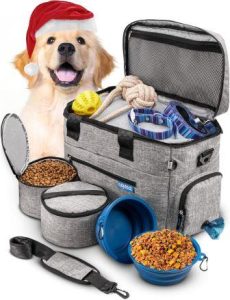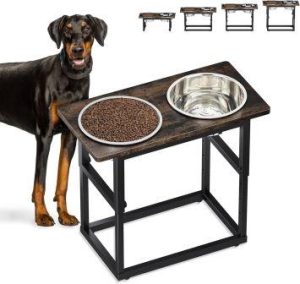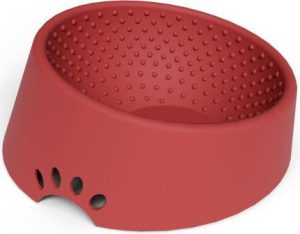Welcome to our guide on the topic of dogs and beans! If you’ve ever wondered whether it’s safe for your four-legged companion to consume beans, you’ve come to the right place. In this article, we will explore the potential benefits and considerations of including beans in your dog’s diet, helping you make an informed decision about your furry friend’s nutritional needs.
Beans, being a staple in many human diets, may seem like a healthy option for dogs too. However, it’s important to understand that not all beans are safe for your canine companion. While some varieties can provide valuable nutrients, others may pose potential risks to their health.
Join us as we delve into the world of dogs and beans, exploring safe choices, nutritional benefits, potential dangers, and suitable alternatives. We’ll also provide tips on gradually introducing beans to your dog’s diet and emphasize the importance of consulting with a veterinarian to ensure your dog’s well-being.
So, let’s get started and find out: can a dog eat beans?
Key Takeaways:
- Not all beans are safe for dogs to consume, so it’s crucial to know which varieties are suitable for your pet.
- Beans can offer nutritional benefits to dogs, providing vitamins, minerals, and fiber that contribute to their overall well-being.
- When introducing beans to your dog’s diet, it’s important to do so gradually and in moderation to prevent digestive issues.
- While beans can be a healthy addition to your dog’s meals, it’s essential to be aware of potential dangers such as choking hazards or indigestion if overfed.
- If your dog cannot tolerate beans or you’re looking for alternative options, there are other sources of protein and fiber that you can explore.
Safe Choices: Beans for Dogs
When it comes to including beans in your dog’s diet, it is essential to know which types are safe for them to consume. Certain beans can be a nutritious addition to their meals, providing them with important vitamins, minerals, and fiber. However, not all beans are suitable for dogs, as some can be toxic and harmful to their health.
Below is a list of dog-friendly beans that you can confidently incorporate into your furry friend’s meals:
- Green beans
- Lima beans
- Black beans
- Pinto beans
These beans are safe and can provide various health benefits to your canine companion. Green beans, for example, are low in calories and high in fiber, making them great for weight management and promoting healthy digestion. Black beans and pinto beans are packed with protein, which is essential for muscle development and overall well-being.
Before serving beans to your dog, it is important to prepare them appropriately. Follow these tips to ensure your pet’s safety and enjoyment:
- Cook the beans thoroughly to make them easier to digest for your dog.
- Avoid adding any seasonings, spices, or sauces that may be harmful or irritating to your dog’s digestive system.
- Allow the beans to cool down before serving to prevent any burns or discomfort.
- Be mindful of portion sizes. Serve beans in moderation to prevent any digestive issues.
Adding beans to your dog’s diet can be a nutritious and tasty experience for them. Just remember to stick to dog-friendly bean varieties, prepare them properly, and monitor your dog’s reaction to avoid any adverse effects.
Nutritional Benefits of Beans for Dogs
When it comes to providing your dog with a balanced and nutritious diet, beans can be a valuable addition. These humble legumes are packed with essential nutrients that can benefit your canine companion in various ways.
Here are some of the key nutritional benefits of beans for dogs:
Fiber
Beans are an excellent source of dietary fiber, which plays a crucial role in maintaining healthy digestion for dogs. Fiber can help regulate bowel movements, prevent constipation, and promote a healthy gut microbiome. Additionally, fiber can aid in weight management and control blood sugar levels in dogs.
Protein
Beans are a rich source of plant-based protein, which is essential for your dog’s overall health and well-being. Protein helps support muscle development, supports a healthy immune system, and contributes to the repair and growth of tissues in dogs.
Vitamins
Beans contain a variety of vitamins that can benefit your dog’s health. For example, they are a good source of vitamin K, which is essential for proper blood clotting. They also contain B vitamins, such as folate and thiamine, which play a vital role in energy metabolism and maintaining a healthy nervous system in dogs.
Minerals
Beans are packed with essential minerals that contribute to your dog’s overall health. They are a good source of potassium, which supports proper muscle function and helps maintain healthy blood pressure levels. Additionally, beans contain minerals like magnesium, iron, and zinc, which play various roles in your dog’s body, including energy production, immune function, and wound healing.
Antioxidants
Beans are rich in antioxidants, such as flavonoids and phenolic compounds, which can help protect your dog’s body from oxidative stress and reduce the risk of chronic diseases. Antioxidants support a healthy immune system and contribute to overall longevity and vitality in dogs.
Carbohydrates
Beans are a source of healthy carbohydrates that can provide your dog with sustained energy throughout the day. Carbohydrates are an important component of a balanced diet and can help support your dog’s activity levels and overall wellbeing.
| Benefits of Beans for Dogs |
|---|
| Fiber |
| Protein |
| Vitamins |
| Minerals |
| Antioxidants |
| Carbohydrates |
As you can see, including beans in your dog’s diet can offer a range of nutritional benefits. However, it’s essential to introduce beans gradually and in moderation, observing your dog’s individual tolerance and preferences. When in doubt, consult with your veterinarian to ensure that beans are a suitable addition to your dog’s specific dietary needs.
Introducing Beans to Your Dog’s Diet
When it comes to incorporating beans into your dog’s diet, it’s essential to do so gradually to prevent any digestive issues. You don’t want to introduce too many new components into their meals all at once. Here, we will provide you with recommendations on portion sizes and creative ways to incorporate beans, ensuring a smooth transition and a happy, healthy pup.
Portion Sizes
Just like with any new food, it’s important to monitor the portion sizes when introducing beans to your dog’s diet. Start with small amounts and gradually increase over time to see how your furry friend tolerates them. This approach allows their digestive system to adjust and minimizes the risk of any adverse reactions.
Cooking Methods
Another important aspect of introducing beans to your dog’s diet is the cooking method. It’s recommended to cook the beans thoroughly to soften them, making it easier for your dog to digest. Avoid adding any seasonings, spices, or ingredients that may be harmful to your pet. Simple boiling or steaming is usually the best cooking method.
Creative Incorporation
While dogs can eat beans on their own, incorporating them into your dog’s meals can provide variety and enhance their overall eating experience. Here are a few creative ways you can include beans in your dog’s diet:
- Mix cooked beans with your dog’s regular food, gradually increasing the ratio as they get accustomed to the taste and texture.
- Add mashed beans as a topper to your dog’s meals, providing additional flavor and nutritional benefits.
- Create homemade dog treats with mashed or pureed beans as one of the main ingredients.
“Introducing beans to your dog’s diet can be a rewarding experience for both you and your pet. By starting with small portions, cooking them thoroughly, and getting creative with incorporating them into meals, you can ensure your dog enjoys the benefits of this nutritious food!”
| Benefits of Introducing Beans to Your Dog’s Diet: |
|---|
| 1. Rich in fiber, aiding digestion |
| 2. Good source of plant-based protein |
| 3. Provides essential vitamins and minerals |
| 4. Helps regulate blood sugar levels |
| 5. Promotes a healthy weight management |
Potential Dangers of Beans for Dogs
Feeding beans to dogs can have some potential risks and dangers that pet owners should be aware of. It is important to understand these risks to ensure the safety and well-being of your furry friend.
Proper Preparation
When it comes to feeding beans to dogs, proper preparation is key. Raw or undercooked beans can cause digestive issues and may even contain toxins that can be harmful to dogs. It is crucial to fully cook beans before offering them to your pet.
Choking Hazards
Some beans, especially larger varieties, can pose a choking hazard to dogs. These can get lodged in their throat or cause obstructions in the digestive tract. It is important to ensure that beans are mashed or cut into appropriate sizes to minimize the risk of choking.
Potential Digestive Issues
While beans are a good source of fiber, introducing them too quickly or in large quantities to your dog’s diet can lead to digestive upset such as gas, bloating, or diarrhea. It’s advisable to start with small amounts and gradually increase over time to allow your dog’s digestive system to adjust.
“Properly cooked and portion-controlled beans can be a part of a balanced diet for dogs, but it’s important to be cautious and mindful of any potential risks and always monitor your dog’s reaction.”
To summarize, while beans can offer certain health benefits to dogs, there are potential dangers that pet owners should be aware of. Taking precautions such as proper preparation, avoiding choking hazards, and introducing beans gradually can help minimize the risks associated with feeding beans to dogs.
| Potential Dangers of Beans for Dogs | Precautions |
|---|---|
| Proper Preparation | Cook beans thoroughly before feeding to dogs. |
| Choking Hazards | Mash or cut beans into appropriate sizes to prevent choking. |
| Potential Digestive Issues | Start with small amounts and gradually increase to prevent digestive upset. |
Bean Alternatives for Dogs
If your dog cannot tolerate beans or if you’re looking for alternative options, we’ve got you covered. Here are some suitable alternatives to beans that can be included in your dog’s diet:
1. Lentils
Lentils are a fantastic alternative to beans for dogs. They are rich in protein, fiber, and essential vitamins and minerals. You can cook them and mix them into your dog’s meals or even use them as a topping for added texture and flavor. Lentils are a safe and nutritious choice for your furry friend.
2. Chickpeas
Chickpeas, also known as garbanzo beans, are another excellent option to consider. They are packed with protein, fiber, and B vitamins. You can give your dog cooked chickpeas as a treat or incorporate them into homemade dog treats. Just make sure to mash or blend them for easier digestion.
3. Green Peas
Green peas are a popular alternative to beans that offer high levels of dietary fiber, vitamins A, K, and B, as well as folic acid. They can be served cooked or frozen for a cool and refreshing treat. Green peas can be a great addition to your dog’s diet, providing nutritional benefits while being gentle on their digestive system.
4. Quinoa
Quinoa is a gluten-free grain that provides a complete source of protein and essential amino acids. It is easy to digest and offers a variety of vitamins, minerals, and antioxidants. Incorporating cooked quinoa into your dog’s meals can help diversify their diet and provide additional nutrients.
5. Sweet Potatoes
Sweet potatoes are not only delicious but also a great source of vitamins, fiber, and antioxidants. They can be cooked, mashed, or dehydrated into chewy treats. Sweet potatoes make a safe and tasty alternative to beans, adding variety to your dog’s meals and providing essential nutrients.
| Bean Alternatives | Nutritional Benefits | Preparation |
|---|---|---|
| Lentils | Rich in protein, fiber, and essential vitamins and minerals | Cook and mix into meals or use as a topping |
| Chickpeas | Packed with protein, fiber, and B vitamins | Cooked or blended for easier digestion |
| Green Peas | High in dietary fiber, vitamins A, K, and B, and folic acid | Serve cooked or frozen |
| Quinoa | Complete source of protein and essential amino acids | Cooked and incorporated into meals |
| Sweet Potatoes | Rich in vitamins, fiber, and antioxidants | Cook, mash, or dehydrate for treats |
Consulting with a Veterinarian
When it comes to your dog’s diet, it’s important to seek professional advice before making any significant changes. Consulting with a veterinarian can provide valuable guidance and ensure that your furry friend’s nutritional needs are met.
By discussing the inclusion of beans in your dog’s diet, you can receive personalized recommendations based on their specific requirements and any potential health concerns. Veterinarians are knowledgeable in assessing your dog’s overall health and can determine if beans are a suitable addition to their meals.
During your consultation, your veterinarian may consider various factors such as your dog’s age, breed, weight, and any existing medical conditions. This comprehensive evaluation will help determine the appropriate portion sizes and frequency of bean consumption for your canine companion.
“Seeking veterinary advice will enable you to make informed decisions about your dog’s diet, ensuring their well-being and avoiding any potential risks,” says Dr. Sarah Johnson, a renowned veterinarian with years of experience in pet nutrition.
Consulting with a veterinarian is crucial before introducing beans into your dog’s diet. Their expertise can guide you in providing a balanced and nutritious meal plan for your beloved companion.
The Role of a Veterinarian
When it comes to the well-being of our pets, veterinarians play a vital role in providing professional guidance and support. They can assess your dog’s unique needs, consider any specific dietary requirements, and address potential concerns related to feeding beans.
Veterinarians can also help monitor your dog’s response to the introduction of beans in their diet, ensuring that they do not experience any adverse reactions or demonstrate signs of digestive discomfort.
Remember, your veterinarian is your trusted ally in navigating the complicated world of canine nutrition. Consulting with them is an essential step in ensuring that your dog remains healthy and happy.
| Benefits of Consulting with a Veterinarian | Dangers of Not Consulting with a Veterinarian |
|---|---|
|
|
Conclusion
In conclusion, dogs can safely consume beans as part of their diet. However, it is important to be aware of the potential risks and benefits associated with feeding beans to your furry friend. By following proper preparation techniques and consulting with a veterinarian, you can include beans as a part of a balanced and nutritious diet for your dog.
Feeding dogs beans can have several benefits. Beans are a rich source of vitamins, minerals, and fiber, which can contribute to your dog’s overall health and well-being. They can provide essential nutrients and help support a healthy digestive system.
While beans offer benefits, it is important to be cautious. Some dogs may have difficulty digesting certain types of beans and may experience digestive issues such as gas or upset stomach. It is crucial to introduce beans gradually into your dog’s diet and monitor their response. Additionally, proper preparation, such as cooking and mashing beans, is necessary to avoid any potential choking hazards.
If you have any concerns or questions regarding including beans in your dog’s diet, it is always best to consult with a veterinarian. They can provide personalized advice based on your dog’s specific needs and dietary requirements, ensuring the safety and well-being of your beloved pet.
FAQ
Can dogs eat beans?
Yes, dogs can eat beans. However, it is important to understand the types of beans that are safe for dogs and how to properly prepare and serve them to avoid any potential risks.
What types of beans are safe for dogs?
Some dog-friendly beans include green beans, black beans, and kidney beans. These beans are not only safe for dogs but also offer nutritional benefits such as fiber, vitamins, and minerals.
How should I prepare and serve beans to my dog?
It is best to cook the beans thoroughly before serving them to your dog. Avoid adding any seasonings, spices, or additives that can be harmful to dogs. Serve the beans in small, appropriate portions that are suitable for your dog’s size and dietary needs.
What are the benefits of feeding beans to dogs?
Beans can provide dogs with essential nutrients, including fiber, protein, and minerals. These nutrients can support their digestion, promote a healthy weight, and contribute to overall well-being.
How should I introduce beans to my dog’s diet?
It is recommended to introduce beans gradually to your dog’s diet. Start with small amounts and monitor for any signs of digestive discomfort. Over time, you can increase the portion size as your dog becomes accustomed to beans.
Are there any dangers associated with feeding beans to dogs?
While beans are generally safe for dogs, some potential dangers include improperly cooked beans, which may be hard to digest or pose a choking hazard. Additionally, overfeeding beans can lead to gas or gastrointestinal upset in dogs. It is important to consult with a veterinarian and follow proper preparation and portion guidelines.
What are some alternatives to beans for dogs?
If your dog cannot tolerate beans or if you prefer alternative options, you can consider including other protein and fiber sources in their diet. Some alternatives include lean meats, vegetables like carrots or peas, and grains such as quinoa or brown rice.
Should I consult with a veterinarian before feeding beans to my dog?
Yes, it is always recommended to consult with a veterinarian before making any significant changes to your dog’s diet. A veterinarian can provide personalized advice based on your dog’s specific needs and ensure that including beans in their diet is appropriate.










